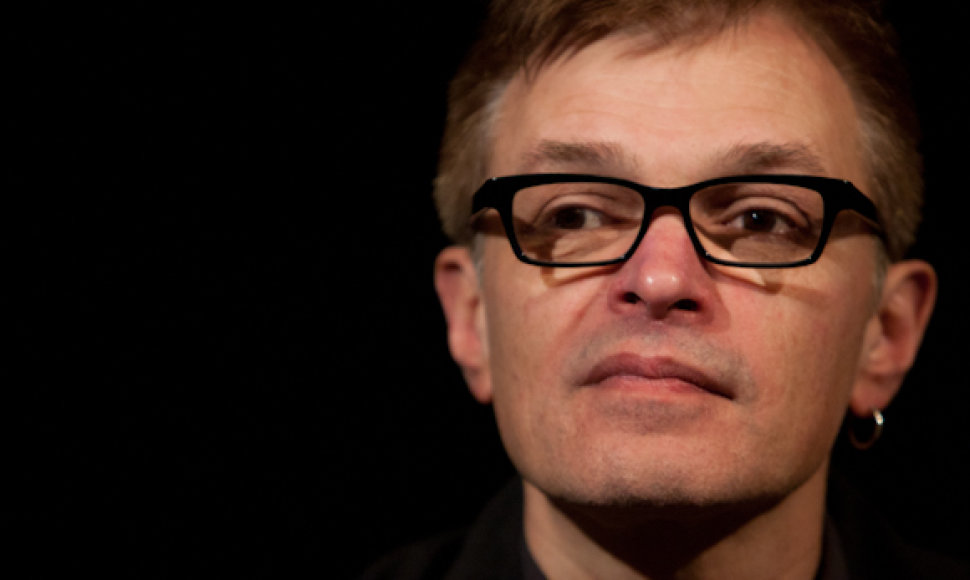This is the dilemma that has occupied theatre director Gintaras Varnas for the last several months, since he decided to stage a play by Canadian playwright Michael MacLennan, “Beat the Sunset.”
An unopened edition of the play spent almost 15 years collecting dust on Varnas' shelf – ever since a friend brought it from Canada.
“One day it just suddenly appeared on top of my pile of books. I picked it up and thought: Well, what is that?” Varnas recalls. He read the play and could not forget it ever since.
“In Canada, the play was produced sometime around 1995-1997 as a response to that same problem of homophobia that is currently rampant in our country. According to a recent statistic, Lithuania ranks second after Romania in terms of homophobia. Or to put it otherwise, we're second-last by our tolerance. The statistics are disconcerting. That is one of the reasons why I want to talk about it on stage,” Varnas tells 15min.
Professional challenge
“Beat the Sunset” (the Lithuanian title sounds closer to “Ticking Bomb”) is a discomforting and provocatively open story about two men who are given hopeless diagnoses – AIDS and epilepsy – and whom their families renounce for their feelings for one another when their childhood friendship develops into romantic love.
 |
| Irmanto Gelūno/15min.lt nuotr./Eimutis Kvoščiauskas |
The leading role was given to Eimutis Kvoščiauskas. “I was tempted by an interesting part for an actor. It is a professional challenge that requires particular effort. A complex part both emotionally and technically. I have to embody different stages of the disease and the character's life: I am sick in one scene, healthy in another. From the present, I dive into a flashbacks when the character is 13 or 18,” Kvoščiauskas says.
The character he plays is colourful indeed and quite complex: he is lost, angry, ambivalent. “It is a huge psychological strain,” the actor admits in between rehearsals.
Emotional kaleidoscope
While preparing for the part, he revisited his own adolescence, researched AIDS, tried to comprehend emotions of a person who hears a fatal diagnosis.
“My dad is currently ill, so I have spent a fair amount of time in hospitals lately. I'm familiar with the atmosphere. We also looked for a person who could tell us about AIDS. The search introduced us to a very interesting woman, a professor, who has been working with people with AIDS for the last 20 years. I wanted to meet someone who has AIDS himself, but people are reluctant to talk about it, they keep everything to themselves,” Kvosčiauskas says.
He also watched films and read books while preparing for the role. “I've read about how people feel and what they do after learning the merciless diagnosis. How to accept such a thing? Some people blame themselves, some blame others. It's an emotional kaleidoscope,” thinks the actor.
Online bile
Any role threatens to put a stamp on an actor, since not all spectators manage to draw a clear line between characters and performers.
“[Director] Oskaras Koršunovas said after the première of [Mark Ravenhill's] “Shopping and Fucking” that everyone would start assuming he was gay... But I don't give it any thought. I care about the role and look at it professionally – I want to do it as best I can,” according to Kvosčiauskas.
He notes, however, that after the performance was announced online, some readers' comments were unkind. One more play, they said, about these “fags,” “fiends,” “perverts,” “sick people.”
“People's reaction only speaks for the topicality of the subject: the gay and AIDS issue is indeed a ticking bomb in Lithuania. And it is one of the functions of theatre to raise inconvenient questions. Besides, homosexuality is not even the central theme in the play – rather, it talks about a bond between two people, be they men or a man and a woman. It is, first of all, a person's journey into himself,” Kvosčiauskas believes.
Disease destroys, love cures
The play speaks about life rather than the approaching nothingness. It is the fatal disease brings characters of the play back to life: when the end is near, there is no room for backing off. The inevitability makes one shed all fears about one's feelings; even if the disease destroys the body, love heals the soul – all of its crusted wounds.
“It is a very profound play with internal problems. We want to stage a good performance – there is nothing poster-like here. The main gay character is a person just like everyone else,” Varnas, the director, says. “Finally, there is one more important theme – tensions between mother and son. How can she accept her child and come to terms with his disease? Mothers could use seeing the play: perhaps it would help them see the situation from the outside. Sometimes theatre is therapy, it helps get through life.”
Education
Varnas has directed a play dealing with homosexuality and AIDS before – his “Faraway country,” based on a play by Jean-Luc Lagarce, premièred in Kaunas State Drama Theatre in 2001. The main character, Louis, is a forty-year-old homosexual man with AIDS.
The piece was a hit and ran for ten years. Why return to the same topic? Is he trying to ride the same horse twice? “I ride whatever I please,” the director grins.
Then he gets serious: “We are not living in the Middle Ages today, yet some of the things we hear sound very medieval or Stalinist. And it hurts. I feel that it is a problem. There are very many homosexual people in our society who are afraid to say who they are, they fear to come out to their parents or neighbours. Some keep lying even to themselves.”
Varnas hopes that his new play will be performed not only in Lithuania's major towns, but in provinces too. “As an education of sorts. For the young generation, especially in Vilnius, homosexuality is not an issue. Intolerance flourishes among elder people and in rural areas.”
Back to classics
“Beat the Sunset” is a chamber play. To put it in musical terms – a quartet. Besides Kvoščiauskas, the cast includes Dalia Overaitė, Viktorija Kuodytė, and rotating Marius Čižauskas and Dovydas Stončius.
How modern is it going to be in terms of form?
“Over the last several years, I've staged some unconventional plays – collages like [Federico Garcia Lorca's] “The Public” or [Guillaume Apollinaire's] “The Breasts of Tiresias.” I've ran into a huge problem – people do not understand. That is something I find very sad. As for “Beat the Sunset,” sometimes the most innovative thing is the long-forgotten classic, even though most theatre critics would beg to differ. But let them – I don't care,” Varnas shrugs.
“It is strange when a spectator says: I do not understand and I do not wish to. Why? Great, if you don't understand – perhaps it's an opportunity to give it some thought, to reflect, to come to your own conclusion? The same goes for the topic of homosexuality and AIDS. Especially since AIDS is not a gay disease, despite widespread beliefs,” Kvoščiauskas agrees.
Optimistic endings are rare in Varnas' oeuvre. “In this case, though, there is a happy end of sorts. Even though the disease does not go away, people come to terms with who they are, with their surroundings, the world. And they do not remain alone with their misfortunes,” Varnas summarizes.
“Beat the Sunset” (“Tiksinti bomba”) premières on 14 October in the National Drama Theatre (Vilnius) and on 28 October in Kaunas State Drama Theatre.
Gintaras Varnas
Born on 7 September 1961.
1980-1983 worked as stage hands and director's assistant at Lithuania's Russian Drama Theatre.
1984-1986 director of an amateur theatre company, 1987-1988 director's assistant at Kaunas State Drama Theatre.
Varnas earned fame after establishing “Šėpa” (“Closet”) theatre company in 1988. He ran it until 1992.
1988-1993 studied theatre directing at the Lithuanian Music Academy.
1989-2004 worked as a freelance director. Varnas directed plays at the State Youth Theatre, the Small Theatre of Vilnius, the Lithuanian Drama Theatre, Kaunas Drama Theatre, the Lithuanian Opera and Ballet Theatre, the Latvian National Opera. Varnas did several internships abroad, took part in independent projects.
2004-2007 art director of Kaunas State Drama Theatre.
In 2005, awarded National Culture and Art Prize.
Established theatre company “Utopia” in late 2007.













